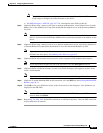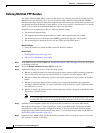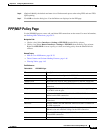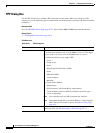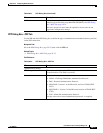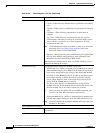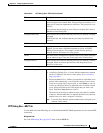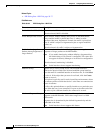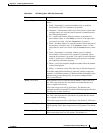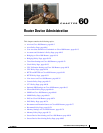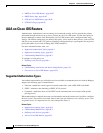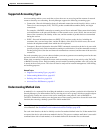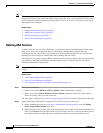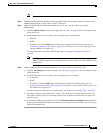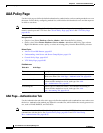
59-81
User Guide for Cisco Security Manager 4.4
OL-28826-01
Chapter 59 Configuring Router Interfaces
PPP/MLP Policy Page
Endpoint Type The identifier used by the router when transmitting packets on the MLP
bundle:
• [null]—Negotiation is conducted without using an endpoint
discriminator. (No CLI command is generated.)
• Hostname—The hostname of the router. This option is useful when
multiple routers are using the same username to authenticate but
have different hostnames.
• IP—A defined IP address. Enter the address or the name of a
network/host object, or click Select to select it. If the object that
you want is not listed, click the Create button to create it.
• MAC—The MAC address of a specific interface. Enter the name of
the interface or interface role, or click Select to select it. If the
object that you want is not listed, click the Create button to create
it.
• None—Negotiation is conducted without using an endpoint
discriminator. (The relevant CLI command is generated, but no
endpoint discriminator is provided.) This option is useful when the
router is connected to a malfunctioning peer that does not handle
the endpoint discriminator properly.
• Phone—An E.164-compliant telephone number. Enter the number
in the field displayed.
• String—A character string. Enter the string in the field displayed.
The default endpoint discriminator is either the globally configured
hostname, or the PAP username or CHAP hostname (depending on the
authentication protocol being used), if you have configured those
values on the PPP tab.
MRRU Local Peer The maximum receive reconstructed unit (MRRU) value of the local
peer. This value represents the maximum size packet that the local
router is capable of receiving.
Valid values range from 128 to 16384 bytes. The default is the
maximum transmission unit (MTU) of the multilink group interface and
1524 bytes for all other interfaces.
MRRU Remote Peer The maximum receive reconstructed unit (MRRU) value of the remote
peer. This value represents the maximum size packet that the remote
peer is capable of receiving.
Valid values range from 128 to 16384 bytes. The default is 1524 bytes.
Maximum FIFO Queue Size The maximum queue depth when the bundle uses first-in, first-out
(FIFO) queuing. Valid values range from 2 to 255 packets. The default
is 8.
Maximum QoS Queue Size The maximum queue depth when the bundle uses non-FIFO queuing.
Valid values range from 2 to 255 packets. The default is 2.
Table 59-33 PPP Dialog Box—MLP Tab (Continued)
Element Description



